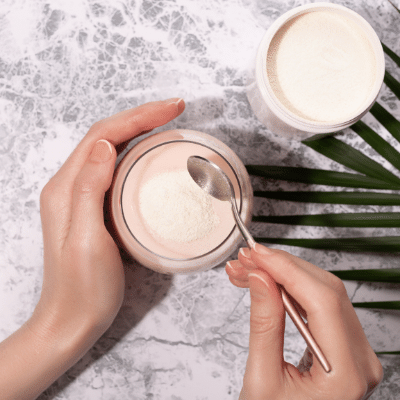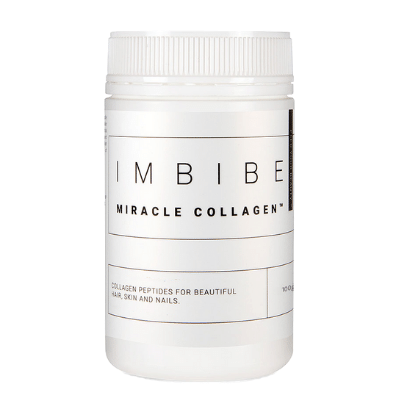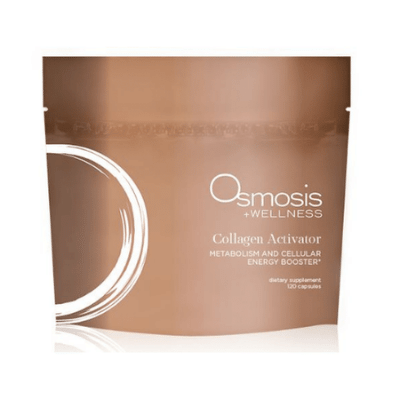
Collagen. It’s the most abundant protein in our body, making up 25% to 35% of our entire protein content. It’s in our bones, tendons, ligaments and muscles. And it plays an important role in our hair, skin, nails and gut health.
There are different types of collagen. But most of them are categorised into Type 1, Type 2 and Type 3.
Type 1 collagen makes up about 90% of all the collagen found in our body. It’s in our tendons, skin, bones, cartilage and connective tissue. Type 2 collagen is mostly found in cartilage. And Type 3 is found next to Type 1, but also in our muscles, organs, arteries and some connective tissue.
As we age, our collagen reduces, and its production slows. This leads to dry skin, wrinkles and other undesirable effects like weak joint cartilage. Its why so many collagen supplements are popping up everywhere.
Why take collagen supplements?
As a major component of our skin, collagen helps to strengthen and improve our skin’s elasticity and hydration.
One study found that women who took a supplement that contained 2.5-5 grams of collagen for eight weeks experienced less skin dryness and an increase in skin elasticity compared to those who didn’t take the supplement. Another study found that women who had a drink mixed with a collagen supplement every day for 12 weeks experienced better skin hydration and a reduction in wrinkle depth.
Did you know? From the ages 25 to 30 we start to produce 1% less collagen a year.
There are other benefits too. Collagen supplements can help hydrate your hair and nails, helping them grow faster and thicker. It can relieve joint pain and reduce inflammation. Boost muscle mass. And promote better heart and gut health.
To date, there are no known risks to taking a collagen supplement, but studies suggest that between 2.5 to 15 grams of collagen a day is considered safe. Some collagen supplements are also made from common food allergens such as fish, shellfish and eggs. Avoid collagen supplements with these ingredients if you have allergies.

How collagen supplements work for better skin health
Collagen supplements come from two sources – bovine connective tissue or fish scales. Many experts recommend purchasing collagen that’s made from grass-fed, pasture raised animals or wild caught fish, and have been certified by a third party for purity.
To create collagen supplements in either powder, capsule or tablet form, collagen proteins are typically broken down through a process call hydrolysis, often known as hydrolysed collagen. This creates a tasteless and odorless powdered form of collagen, often referred to as collagen peptides, that are smaller and easier for our bodies to absorb.
As a protein, collagen is made up of chains of amino acids, including glycine, proline, lysine and hydroxyproline. These act as the bricks of the skin. Just like we use bricks to build a house, we need protein to build new collagen. Without protein, and its amino acids, new collagen and elastin can’t form.
Hydrolysed collagen keeps these amino acid chains intact. That’s why collagen peptides or collagen with amino acids in its ingredients are the best options to look out for.
Did you know? 30% of collagen is the amino acid glycine. Glycine is shown to help repair leaky gut.
Other ingredients may be included to support skin health including, silica, hyaluronic or vitamin C. And while flavoured collagen supplements can be a good option to add more flavour to your daily routine, keep an eye out for the sugar content as too much sugar can reverse its effects.
Our collagen supplement picks
Regenerate by Osmosis
Packed with amino acids this collagen supplement is all about improving liver health. By creating a healthy liver your skin texture and cellular function improves. Plus, the added amino acids provide the tools your skin needs to create new collagen fibres.
Imbibe Miracle Collagen
Contains 18 amino acids and collagen peptides only, supporting healthy hair, skin and nails. As a powder form, you can put this collagen supplement in your breakfast smoothie, on food or any other way that suits you.
Osmosis Collagen Activator
This supplement focuses on improving and optimising cellular function which then in turn improves collagen synthesis. By taking this supplement ATP, the name for cellular energy, is improved which aids collagen creation.
Research resources
- Benefits: https://www.healthline.com/nutrition/collagen-benefits#2.-Helps-relieve-joint-pain
- What it is: https://www.medicalnewstoday.com/articles/262881#preventing-collagen-loss
- https://www.healthline.com/nutrition/best-collagen-for-skin#our-picks
- https://www.livekindly.co/collagen-vegan/#:~:text=Collagen%20is%20a%20protein%20made,or%20fish%2C%20from%20marine%20collagen.
- https://nourishedbynutrition.com/ultimate-guide-collagen-supplements/
- https://blog.hif.com.au/healthy-lifestyle/do-collagen-supplements-really-work-here-s-what-the-studies-show
- https://www.verywellhealth.com/best-collagen-supplements-4587056
- Types of collagen: https://www.vitalproteins.com/blogs/stay-vital/collagen-peptides-types#
- Collagen peptides: https://www.webmd.com/vitamins/ai/ingredientmono-1606/collagen-peptides#:~:text=Collagen%20peptides%20are%20small%20pieces,support%20most%20of%20these%20uses.
- Marine collagen: https://www.mindbodygreen.com/articles/marine-collagen-101
- https://www.ncbi.nlm.nih.gov/pmc/articles/PMC6566836/








 Webential
Webential